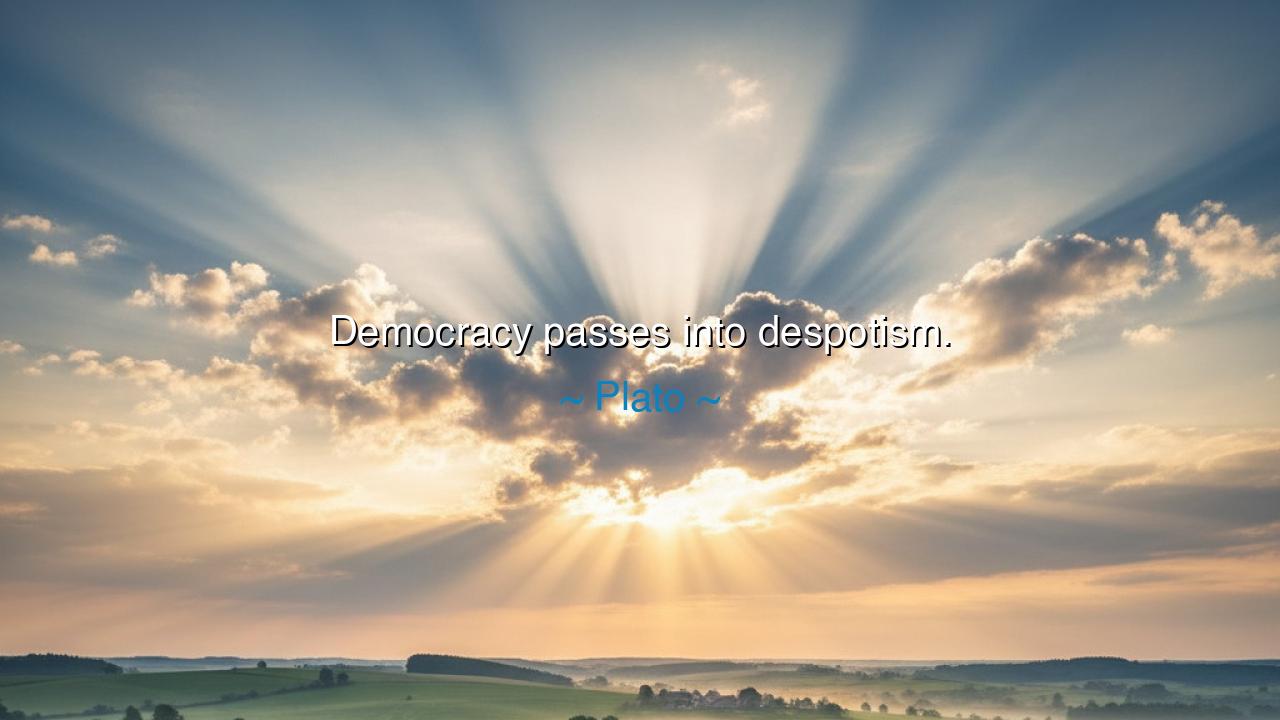
Democracy passes into despotism.






When Plato wrote, “Democracy passes into despotism,” he was not merely observing the politics of his age — he was unveiling a law of the human soul. His words, brief and timeless, rise like a warning bell across the centuries. To him, democracy was not only a form of government, but a mirror of mankind’s inner nature. When the soul becomes ungoverned — when passion dethrones reason and liberty turns into license — then the outer world must follow. Thus, what begins as freedom ends as servitude. Plato saw this pattern as inevitable: from liberty unrestrained, comes chaos; from chaos, the longing for order; and from that longing, the birth of tyranny.
The origin of this quote lies in Plato’s masterpiece, The Republic, where he examines the rise and fall of governments as reflections of the moral state of their people. Writing in the shadow of Athenian democracy, Plato had witnessed firsthand how the freedom and equality of his city had degenerated into mob rule, demagoguery, and ultimately, the execution of his beloved teacher, Socrates. To him, democracy’s promise of freedom had turned poisonous — it had elevated emotion over wisdom, flattery over truth, and self-interest over virtue. What the people called liberty was, in fact, the beginning of anarchy, and when that anarchy exhausted them, they would seek refuge in the chains of a tyrant. Thus, his warning was not against freedom itself, but against its corruption.
Plato taught that every system of government is born, flourishes, decays, and dies — and democracy, though radiant in birth, is fragile in maturity. In its earliest form, it springs from noble rebellion — the rejection of oppression and the triumph of equality. But over time, as citizens grow accustomed to liberty, they mistake freedom for indulgence. The discipline that guards justice fades; authority becomes hated; all opinions, whether wise or foolish, are treated as equal. The people demand more freedom — freedom from virtue, from restraint, from truth itself. And so, the state, once guided by reason, becomes ruled by appetite. In this confusion, Plato saw the seed of tyranny already sown — for in the exhaustion of chaos, the people will beg for a strong hand to deliver them from their own excesses.
History, the eternal witness, has proven Plato’s prophecy again and again. Consider the fall of ancient Athens itself — the very city that gave the world philosophy, art, and democracy. In its golden age, it was the beacon of liberty. But as its citizens grew complacent and prideful, they fell prey to demagogues — men who flattered the people, promising them wealth, glory, and ease. Wars followed, corruption spread, and faith in virtue crumbled. When at last the city lay weakened and humiliated, the people turned in despair to those who offered order through force. Thus, democracy’s flame dimmed, and the tyrants rose to rule in the name of saving it. What Plato had warned became truth: the love of unbounded freedom had birthed despotism.
The same pattern echoes in later ages — in the fall of the Roman Republic, which drowned its liberty in luxury and power, and even in the modern world, where democracies wrestle with the weight of their own freedoms. Whenever a people grow so intoxicated with their rights that they forget their duties, they drift toward decay. When citizens no longer seek truth but only validation, and leaders no longer serve but only perform, freedom loses its sanctity. In the noise of clashing desires, the call for order grows louder — until one voice promises to silence the chaos. The people, weary of confusion, will surrender liberty for comfort, and democracy, once bright with idealism, will sink into the shadows of despotism disguised as safety.
Yet Plato’s teaching is not merely a lament — it is a summons. He warns us not to despair of freedom, but to discipline it. Democracy must be guarded not by laws alone, but by virtue, by citizens who are wise, self-restrained, and guided by conscience. For if a people govern themselves poorly, no constitution, however perfect, can save them. True liberty, Plato tells us, is not the right to do whatever one pleases, but the strength to do what is just. Without that strength, freedom becomes a chain forged by our own hands.
The lesson is eternal: freedom without virtue leads to slavery. A democracy endures only when its people are vigilant — when they question themselves as much as they question their rulers, when they prize wisdom above comfort, and duty above desire. Each generation must renew the moral foundations upon which liberty stands, or it will watch them crumble beneath the weight of their own indulgence. The wise must teach the young that freedom, like fire, can warm or destroy — and that it must be tended with reverence, not left to burn unguarded.
So let Plato’s words echo in our age as they did in his: “Democracy passes into despotism.” Take them not as prophecy, but as warning; not as despair, but as guidance. For the fate of nations lies not in their rulers, but in the souls of their citizens. Let each man govern himself with justice and humility, and no tyrant will ever rise. But let liberty decay into license, and even the freest people will forge their own chains. Thus spoke the sage of Athens — and thus, across the centuries, his wisdom still stands: that the strength of freedom is the virtue of those who keep it.






AAdministratorAdministrator
Welcome, honored guests. Please leave a comment, we will respond soon